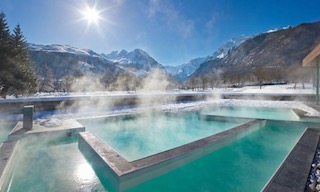It’s no wonder that the French love visiting the doctor here in France; French Doctors have at their fingertips the ability to prescribe you ‘the cure’. Now that is what you want from a doctor. Apparently ‘the cure’ can be prescribed for all sorts of illnesses and ailments ranging from arthritis to asthma to diabetes and poor circulation to name just a few.
And it turns out that the cure is just as appealing as it sounds because it predominantly involves a trip to a thermal baths/spa to soak in the water and be given various treatments involving minerals, massages, and thermal mud. These treatments can take anything from a few days to three weeks and, in addition, France having some of the best health care in the world, the majority of the cost of these treatments is covered by the French state with the rest usually being paid for by the patient’s top up health insurance known as a mutuelle.
So, I guess it is not surprising that the market in France for thermal treatments is a large one. In 2021, 326,000 people visited thermal spas for ‘the cure’ and France has more than 770 thermal springs with over 100 stations thermales.
The beneficial effects of thermal cures are well-known since ancient times; the Egyptians, Phoenicians, Hebrews, and Israelites all practiced immersing themselves in cold and hot water and, in Oriental cultures, water therapies were prescribed by religious laws. In Italy, the Etruscans, living in a country rich in natural springs, were one of the first to use water for healing purposes. The ancient Greeks believed in the therapeutic benefits of hot baths and mineral waters and studied their properties and effects on health.
The Romans expanded on the use of mineral and thermal baths as social experiences. They constructed the first large-scale spas with elaborate aqueduct systems carrying mineral waters to private stone tubs, steam rooms and public bathing areas and magnificent edifices (thermae) with a capacity for hundreds or thousands of people.
During the 1800s, bathing became very fashionable and the interest in the health benefits grew; doctors were convinced that for each disease there was an appropriate medicinal spring, which could be discovered through chemical analysis of the waters. Throughout Europe during the Belle Epoch, spas became an integral part of life for the elite. Every spa resort had its own theatre, casino, and promenades besides the bathing buildings. Grand hotels arose with casinos and dancing establishments surrounding the spa resorts.
More recently, health, wellness and spa tourism has become a rapidly growing sector of the tourism industry worldwide.
And it turns out that the Pyrenees is the place to come for the most healing and beneficial thermal baths, treatments, and spas. The three regions of the Pyrenees represent 48.6% of the French thermal spa activity and, in terms of the number of springs and the water quality, the hydrothermal richness of the Pyrenees is unrivalled. For example, the waters in our local spa town of Bagnères de Luchon have the highest sulphur content in the Pyrenees. With 118 natural springs, Luchon is one of the oldest and best-known thermal spa towns in France. Plus, in the next valley, there is the much newer Balnéa leisure spa on the banks of Génos-Loudenvielle lake. Here you can bathe in numerous themed, outdoor hot baths while enjoying views of snow-capped mountains and the health benefits of the hot springs which is an incredible experience even when one doesn’t need ‘the cure’.
What does this all have to do with the property market? Well quite a lot in fact, because it explains the year-round popularity of thermal towns in France and hence the high demand for rental properties throughout the year. So, for example, in Bagnères de Luchon, people visiting for ‘the cure’ tend to come in low season which is spring and autumn while the winter season is booked out by skiers and the summer by walkers, cyclists and summer holidaymakers. So, although ‘the cure’ might seem like another generous hand out by the French state, it also has a huge number of knock-on benefits in numerous towns around the country and ultimately ensures both a thriving year-round holiday market and a thriving property and rentals market as well as year-round business for the shops and restaurants.
If you would like help with your French property search or more information, please get in touch: nadia@foothillsoffrance.com






You must be logged in to post a comment.